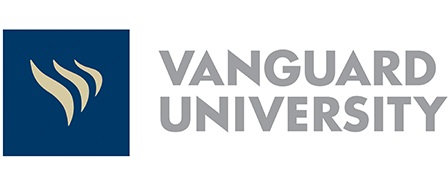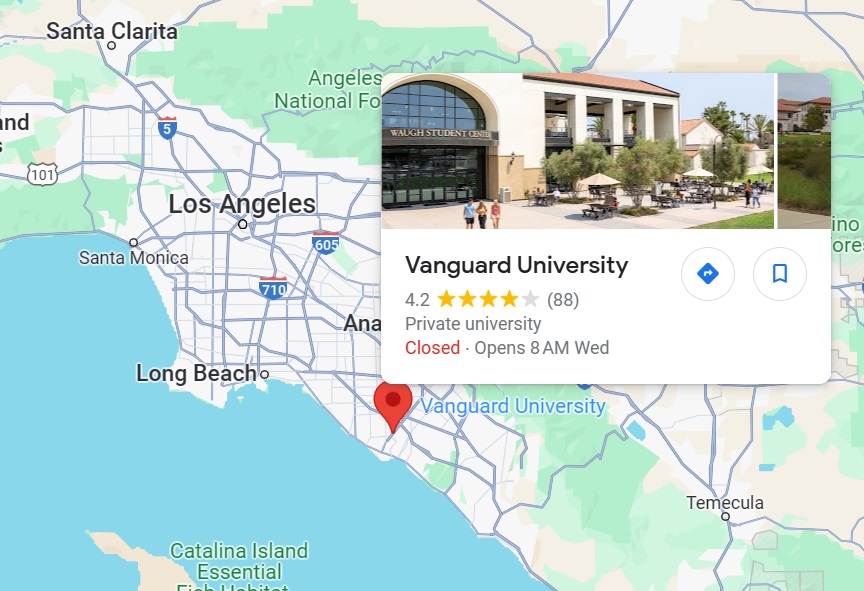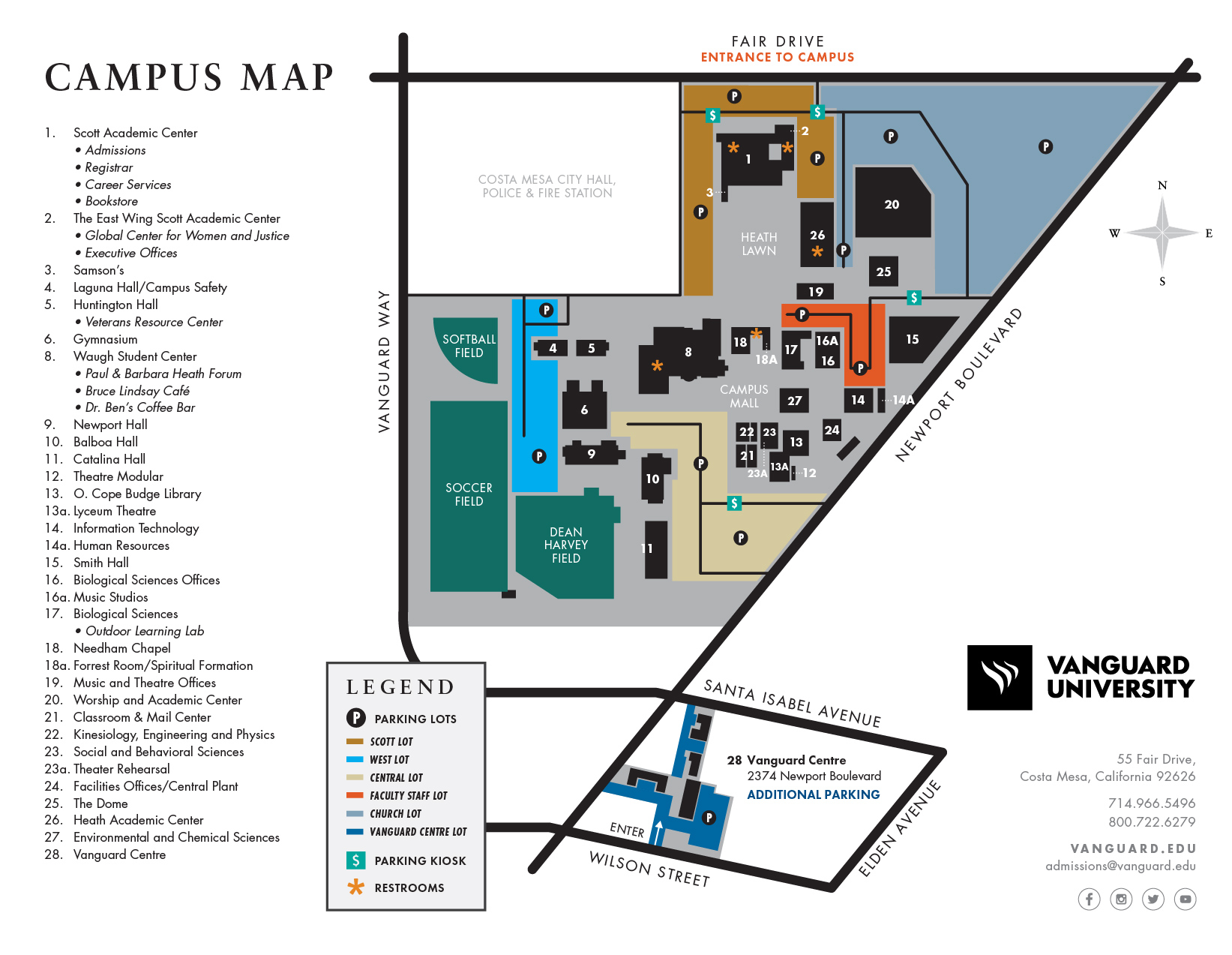Vanguard University: A Proven Pathway to Success


Vanguard University, located in Costa Mesa, California, is a private Christian university committed to providing a transformative educational experience grounded in faith, scholarship, and service. Established in 1920, Vanguard has a rich history rooted in the Pentecostal tradition and a dedication to academic excellence and spiritual growth.
The university traces its origins to the Southern California Bible School, founded by Harold K. Needham in 1920. The institution evolved and expanded its offerings, eventually becoming the Vanguard University of Southern California in 1999.
Throughout its history, Vanguard has remained steadfast in its mission to prepare students with the knowledge, skills, and values necessary to lead purposeful lives and positively impact the world.
Vanguard University’s mission is to pursue knowledge, cultivate character, deepen faith, and equip students for a life of leadership and service. Guided by Christian principles, the university seeks to foster an inclusive community where students from diverse backgrounds can engage in rigorous intellectual inquiry, spiritual formation, and personal development.
Commitment to excellence, integrity, and compassion, Vanguard University prepares graduates to serve their communities with integrity, compassion, and a commitment to social justice.
Academic Programs
Undergraduate Programs
Bachelor’s Degrees in Various Fields: The undergraduate program offers bachelor’s degrees across various disciplines, including but not limited to arts, humanities, sciences, social sciences, business, engineering, and health sciences.
These programs provide students comprehensive knowledge and skills, preparing them for careers or further education. Courses are designed to be relevant, incorporating both theoretical foundations and practical applications.
General Education Requirements: Besides major-specific coursework, undergraduate programs include general education requirements to provide students with a well-rounded education.
These requirements typically cover writing and communication, quantitative reasoning, natural sciences, social sciences, humanities, and interdisciplinary studies. General education courses help students develop critical thinking, communication, and problem-solving skills necessary for success in any profession.
Graduate Programs
Master’s Degrees and Professional Programs: Graduate programs offer advanced study and specialized training in various fields, leading to master’s degrees or professional certifications.
These programs cater to students seeking to deepen their knowledge, develop expertise, or advance their careers in specific areas.
Examples include Master of Arts, Master of Science, Master of Business Administration, and Master of Public Health (MPH), and specialized professional certifications in education, healthcare, finance, and information technology.
Specialized Certifications: Besides traditional master’s degrees, graduate programs may offer technical certifications or professional development programs to enhance specific skills or credentials.
These certifications are often tailored to industry standards and may be completed with or independently of a degree program. Examples include project management certifications, industry-specific credentials, teaching certifications, and licensure programs for healthcare professionals.
Online Learning Options and Continuing Education Opportunities
Online Learning Options and Continuing Education Opportunities cater to individuals seeking flexible learning options or professional development outside traditional degree programs. These offerings may include:
Online Courses and Degree Programs: Institutions offer online courses and programs that allow students to complete coursework remotely, providing flexibility for working professionals, adult learners, or individuals with other commitments.
Online programs often mirror on-campus offerings’ curriculum and academic standards, providing access to lectures, assignments, and interactive learning materials through virtual platforms.
Continuing Education and Professional Development: Continuing education programs offer non-degree courses, workshops, seminars, and certificate programs designed to enhance professional skills, update knowledge, or explore new career paths.
These programs cater to specific industries, professions, or skill areas, providing opportunities for lifelong learning and career advancement. Continuing education options accommodate individuals at various stages of their careers and may include licensure renewal, skill-specific training, or personal enrichment courses.
Campus Facilities and Resources

Academic Facilities
Classrooms, Laboratories, and Lecture Halls: The campus features modern and well-equipped classrooms, laboratories, and lecture halls to facilitate effective teaching and learning.
Classrooms have multimedia technology, audio-visual equipment, and interactive whiteboards to support dynamic instruction and student engagement. Laboratories provide hands-on learning experiences in science, engineering, healthcare, and other disciplines, while lecture halls accommodate larger classes and guest lectures.
Libraries and Research Centers: The campus boasts extensive library resources, including print and electronic collections, research databases, and scholarly journals, to support academic inquiry and research.
Libraries offer quiet study spaces, collaborative work areas, computer labs, and access to specialized research assistance from librarians. Research centers provide opportunities for faculty and students to conduct interdisciplinary research, collaborate on projects, and contribute to knowledge advancement in various fields.
Student Support Services
Counseling and Advising Services: Professional counselors and academic advisors offer personalized support to students in academic, personal, and career-related matters.
Counseling services provide confidential assistance with mental health concerns, stress management, and personal development, while academic advisors assist students with degree planning and academic progress monitoring. These services promote student well-being, success, and retention.
Career Development and Internship Programs: Career services offices provide resources, workshops, and individualized assistance to help students explore career options, develop job search skills, and secure internships or employment opportunities.
Career counselors offer guidance on resume writing, interview preparation, networking strategies, and professional development. Internship programs facilitate experiential learning and industry connections, allowing students to gain practical work experience and apply classroom knowledge in real-world settings.
Extracurricular Facilities and Activities
Campus Clubs, Organizations, and Student Government: The campus offers a diverse array of clubs, organizations, and student government associations representing various interests, identities, and cultural backgrounds.
These groups provide opportunities for students to pursue shared interests, develop leadership skills, and engage in campus and community service initiatives. Student government plays a vital role in advocating for student interests, organizing events, and fostering a sense of community and belonging.
Athletic Facilities and Intramural Sports Programs: The campus boasts state-of-the-art athletic facilities, including gymnasiums, fitness centers, playing fields, and courts, to support recreational and competitive sports activities.
Intramural sports programs offer students of all skill levels opportunities to participate in organized sports leagues, tournaments, and fitness classes. These programs promote physical health, teamwork, camaraderie, and school spirit among students.
Faculty and Staff
Credentials and Areas of Expertise: Faculty members possess diverse educational backgrounds, including advanced degrees, professional certifications, and industry experience relevant to their respective fields.
Their areas of expertise encompass various disciplines, from arts and humanities to STEM fields and beyond. Faculty may hold doctoral degrees, master’s degrees, or professional credentials in their areas of specialization, bringing depth and breadth of knowledge to the classroom.
Teaching Philosophies and Methodologies: Faculty members adhere to various teaching philosophies and methodologies that reflect their pedagogical beliefs and approaches to instruction.
Some emphasize experiential learning, active participation, and inquiry-based methods to engage them in critical thinking and problem-solving.
Others may employ lecture-based formats supplemented with hands-on activities, group projects, or technology-enhanced learning strategies.
Faculty prioritize student-centered learning experiences that foster intellectual curiosity, creativity, and lifelong learning skills.
Administrative Staff Roles
Academic Administration and Departmental Leadership: Administrative staff oversee academic departments, programs, and curricular initiatives, providing strategic direction, administrative support, and leadership to faculty and students.
They collaborate to develop and implement academic policies, curriculum revisions, and program assessments. Department chairs, deans, and educational administrators are critical in faculty recruitment, retention, professional development, and performance evaluation.
Student Affairs and Support Services: Administrative staff members in student affairs departments coordinate various support services and extracurricular activities to enhance the student experience and promote student success.
They oversee student orientation, residential life, campus activities, student organizations, and student conduct. Student affairs professionals provide resources, advocacy, and programming to support students’ personal, academic, and social development, fostering a vibrant and inclusive campus community.
Community Engagement and Partnerships
Community Service Projects and Outreach Initiatives: The institution collaborates with local nonprofit organizations, schools, and community agencies to develop community service projects, volunteer opportunities, and outreach initiatives.
Students, faculty, and staff engage in service-learning activities, civic engagement projects, and philanthropic efforts that address community needs and promote social responsibility.
Internship Opportunities and Partnerships with Businesses: The institution cultivates partnerships with local businesses, corporations, and industry leaders to provide internship opportunities, co-op experiences, and professional development opportunities for students.
These partnerships offer students hands-on learning experiences, mentorship opportunities, and pathways to employment in their chosen field.
Global Engagement and Mission Trips
International Partnerships and Study Abroad Programs: The institution fosters global engagement through partnerships with international universities, study abroad programs, and cultural exchange initiatives. Students can learn, conduct research, or participate in service-learning projects abroad, gaining cross-cultural perspectives, language proficiency, and intercultural competencies.
Service-Learning Opportunities and Cross-Cultural Experiences: The institution promotes service-learning opportunities that combine academic coursework with community service projects, both domestically and internationally. These experiences allow students to apply classroom knowledge to real-world issues while fostering empathy, cultural understanding, and social responsibility. Mission trips and alternative break programs provide immersive experiences that promote personal growth, global citizenship, and social justice advocacy.
Student Demographics and Diversity
Enrollment Statistics
Total Student Population: The institution serves a diverse population encompassing undergraduate, graduate, and non-traditional learners across various academic disciplines and program levels.
Demographic Breakdown (Age, Ethnicity, etc.): Enrollment data reflect the demographic diversity of the student body, including factors such as age, ethnicity, race, gender identity, socioeconomic status, and international representation. The institution values diversity and creates an inclusive campus environment that celebrates and respects individuals’ unique backgrounds, identities, and perspectives.
Initiatives for Diversity, Equity, and Inclusion
Diversity Programs and Multicultural Events: The institution sponsors diversity programs, cultural celebrations, and multicultural events throughout the academic year to promote awareness, dialogue, and understanding of diverse perspectives and experiences. These initiatives highlight the contributions of underrepresented groups, address social justice issues, and foster a sense of belonging and inclusion for all campus community members.
Support Services for Underrepresented Groups: The institution provides support services, resources, and affinity groups tailored to the needs of student populations, including first-generation college students, students of color, LGBTQ+ students, students with disabilities, and international students. These services may include mentorship programs, academic support, counseling services, leadership development opportunities, and advocacy initiatives to promote equity, inclusion, and student success.
Accreditation and Institutional Quality
Accreditation Status and Agencies
The institution maintains accreditation from recognized accrediting bodies, ensuring adherence to rigorous standards of quality and accountability in higher education. Accreditation may vary depending on the specific programs and services offered. Standard accrediting agencies include:
- Regional Accreditation: The institution holds accreditation from one of the regional agencies recognized by the U.S. Department of Education, such as the Higher Learning Commission, Middle States Commission on Higher Education, New England Commission of Higher Education, Northwest Commission on Colleges and Universities, Southern Association of Colleges and Schools Commission on Colleges, or the Western Association of Schools and Colleges Accrediting Commission.
- Programmatic Accreditation: Certain academic programs or professional schools may hold specialized accreditation from discipline-specific accrediting bodies. Examples include the Accreditation Board for Engineering and Technology, the Commission on Collegiate Nursing Education, the Association to Advance Collegiate Schools of Business, and the National Council for Accreditation of Teacher Education.
Institutional Effectiveness and Assessment
Academic Program Reviews and Accreditation Standards: The institution regularly reviews educational programs to assess compliance with accreditation standards, evaluate program effectiveness, and identify areas for improvement. These reviews involve comprehensive self-studies, external evaluations, and peer assessments conducted by accreditation agencies or professional organizations. Programs undergo rigorous scrutiny to ensure alignment with industry best practices, educational benchmarks, and institutional mission and goals.
Student Learning Outcomes Assessment and Continuous Improvement Initiatives: The institution systematically assesses student learning outcomes and educational effectiveness across all programs and disciplines. Faculty and administrators collaborate to define measurable learning objectives, design assessment methods, collect data, analyze results, and implement evidence-based improvements. Assessment findings inform curriculum revisions, pedagogical enhancements, and institutional decision-making to enhance student learning, retention, and success. The institution fosters a culture of continuous improvement, innovation, and accountability to uphold academic excellence and meet the evolving needs of students and stakeholders.
Accessibility / Disability Services
Vanguard is committed to providing comprehensive support for students with disabilities. Their Disability Services office ensures that all students have equal access to programs, services, and activities. Here are some of the facilities and accommodations available:
- Academic Accommodations:
- Vanguard offers reasonable academic accommodations tailored to individual needs. These may include extended test-taking time, note-taking assistance, and alternative formats for course materials.
- Housing & Dining Accommodations:
- The university collaborates with students to create accessible housing and dining arrangements. They consider mobility, dietary, and other specific requirements.
- Testing Accommodation Center (TAC):
- The TAC provides a supportive environment for students during exams. It ensures that students receive the necessary accommodations, such as extra time or a quiet space.
For more detailed information, you can visit the Disability Services webpage or refer to the Student Disability Services Handbook provided by Vanguard University
Data on Vanguard University
| Category | Data |
| Location | Costa Mesa, California |
| Type | Private, Christian university |
| Denomination | Assemblies of God |
| Founded | 1920 |
| Accreditation | WASC Senior College and University Commission |
| Total Enrollment | Approximately 2,000 |
| Undergraduate Programs | Over 30 majors and concentrations |
| Graduate Programs | Master’s degrees in 6 fields |
| Mascot | Lions |
| Colors | Blue and Gold |
| Motto | “Truth, Virtue, and Service” |
| Student-Faculty Ratio | 15:1 |
| Acceptance Rate | Approximately 69% |
| Retention Rate | 81% |
| Graduation Rate | 59% |
| Student Demographics | A diverse student representing various ethnicities and backgrounds |
| Campus Size | Approximately 38 acres |
| Notable Alumni | Various leaders in ministry, education, business, and the arts |
| Campus Facilities | Modern academic buildings, state-of-the-art laboratories, library, student center, residence halls, athletic facilities |
| Athletics | Member of the NAIA Golden State Athletic Conference, offering various sports programs |
| Religious Life | Chapel services, spiritual formation programs, and community outreach activities |
| Website | www.vanguard.edu |

Vanguard University Campus Map

Conclusion
Vanguard University stands as a beacon of excellence in higher education, rooted in its Christian values and commitment to academic rigor. Its diverse programs, student-centered approach, and emphasis on service have significantly shaped future leaders.
Looking ahead, Vanguard faces challenges adapting to evolving educational landscapes while staying true to its mission. As we reflect on its impact, let’s continue to engage with Vanguard’s community and support its endeavors, ensuring a bright future of continued growth and innovation in education.
- Best Engineering Schools in California
- California State University, Northridge cost of tuition
- California Institute of Integral Studies Acceptance Rate
- Ivy League Schools in California
- UC Berkeley Housing Overview
- Good Jobs for College Students
- Difference between College and University
- How Long is a College Semester
- What to know as a first generation college student
- Best Finance Schools
- What is College Board Big Future
- California Student Aid Commission
- Best Community Colleges in California
- What is Rolling Admission
- Scholarship Interview Questions
- College Acceptance Letter and what it entails
- What College Should I Go To
- UCLA Transfer Acceptance Rate
- California Northstate University College of Medicine
- Best Business Schools in California

Leave a Reply